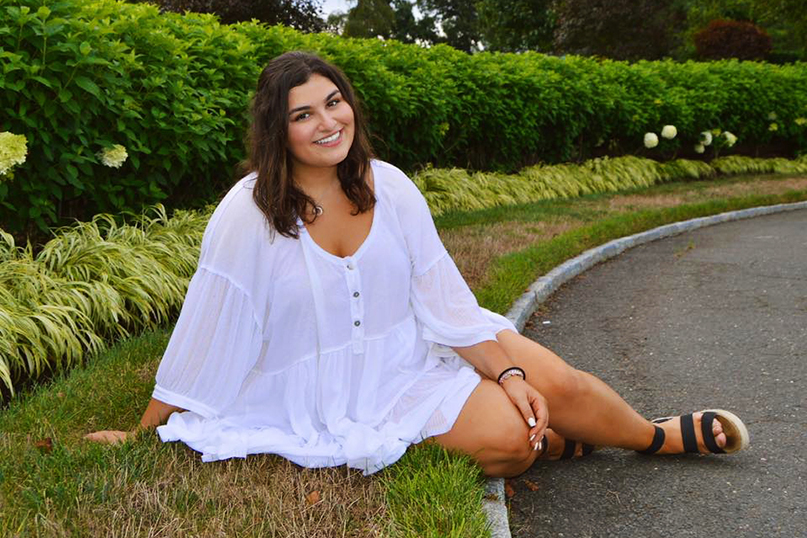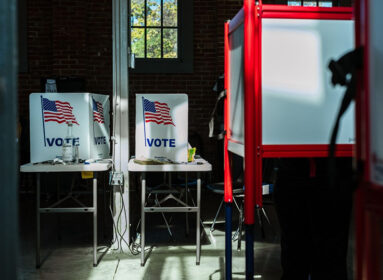
By Alan Zeitlin
(JNS) A Jewish student at the University of Connecticut says she feels betrayed after being thrown out of her a cappella group, saying she was called a “white supremacist,” “f***ing Zionist” and a f***ing b*tch, and has received threats after a Feb. 28 incident was mischaracterized online.
Natalie Shclover, a senior in the Business School at the University of Connecticut, and a member of the Honors College, told JNS that she and her Muslim boyfriend, Zacharia El-Tayyeb, were bothered by fliers put up by the Muslim Student Association that stated as fact that Israel was an apartheid state and included an image of a map of Israel with interim university president, Dr. Radenka Maric, on one side and a baby being strangled. This, she said was due to Maric’s announcement on Instagram that she would visit Israel on a trip with Gov. Ned Lamont (D-Conn.). Shclover said she discarded a few fliers that covered ones posted by the campus Chabad or Hillel, were in excess or were on the floor, which violates school rules because only one flier is supposed to be affixed to each bulletin board.
When she and her boyfriend went to the third floor and he removed excess fliers, she was badgered and called names. A video with a caption claims that she harassed Muslim students, but the video only shows students hurling slurs at her.
The senior, who was president and music director of the UConn Chordials, said that in a Zoom meeting she was told she was being kicked out of the group and given no chance to explain her side of the story. She had worked on an agreement to secure $10,000 to make an album and had done arrangements for the group, she said, and suddenly, she was out.
“I believe they first met on their own, then joined me into their Zoom call and dismissed me, saying they had no other choice” but to do so, she said. “They said basically that ‘after discussing the events, we have decided we need to dismiss you.’ I mentioned it was a mischaracterization of my character and unjust, and that was the end of it.”
‘That’s where I felt the safest’
The UConn Chordials released a statement that they “do not tolerate behaviors that cause pain, distress or damage to others; especially those of a different race, ethnicity, nationality or religion. …These actions do not reflect the beliefs of the UConn Chordials as a whole, or the UConn a cappella community. We sincerely apologize for the actions of our former president. We hear you, we take accountability, and we promise to show you that we are better than this moving forward.”
Shclover said she auditioned three-and-a-half years ago with the song “Lullaby of Birdland” by Ella Fitzgerald and made the group.
“When I first joined a cappella, it was sort of a last straw try for me at the university because I was having a hard time adjusting and was considering transferring,” she said. “But ‘The Chordials’ became my home. That’s where I felt the safest.”
She said she lives with one member of the group, as well as a Christian former member who resigned because she didn’t believe it was right to throw Shclover out “without due process.”
She was slated to sing a solo of “Summertime” in her final show on April 30. Now, she doesn’t know if the group will even have a show or if someone else will sing the song.
Asked if she would go back to the group if they reinstated her, she replied: “No, I don’t think so because I don’t think that would help the damage that has been caused. I hope they will learn from their mistakes. I feel betrayed. I can’t look at them with the same perspective anymore. But I would never wish anything bad upon them because they were my safe haven for [a while], and I wouldn’t want that opportunity to be taken away from someone else. The UConn A Cappella Association needs to take accountability for not treating me fairly.”
Shclover said she was not able to get in touch with anyone from the association despite multiple attempts. She said she had been elected president by a unanimous 14-0 margin and expected group members to know the person she was. She said after the video went viral, she was inundated with threats, including one person who messaged: “I swear to God, the next time I see you, I’ll slap you.”
She said other students stared her down in a threatening manner; she believed they had seen the video, and that this was the result. The campus newspaper printed a story that didn’t name her but stated that Muslim students had been harassed.
‘It’s disheartening and shocking’
El-Tayyeb said it was surprising to see how quickly the members of the group turned on his girlfriend without any evidence that she harassed anyone.
“I couldn’t imagine how a group of students two weeks prior on February 9 sang me ‘Happy Birthday’ and seemed so kind-hearted, would act like this,” he said. “It’s disheartening and shocking.”
He also said it was absurd to claim that his girlfriend would harass someone for being Muslim when they are dating.
“Natalie is one of the most informed people I know,” he said. “I would be the first to let her know if she was acting Islamophobic in any way.”
He said he was a victim of an anti-Muslim incident some years ago on a bus when students looked at him and said he “might have a bomb.”
He said he met his girlfriend on the first night of college when an impromptu breakdancing competition took place; their relationship has flourished, he said, because they respect each other’s views and religious differences.
He also said he was attracted to her humor and her ability to relate to people.
“You open a random door and people come in, and you know she’ll make friends,” he said.
He added that he hoped a byproduct of the relationship would be to bring Jews and Muslims closer. The pre-law student said there was likely no due process because the group “wanted to appease the crowd” and possibly feared that keeping her in the group could result in boycotts.
Currently, there is a change.org petition titled “Protect UConn Student From Antisemitic Harassment” that as of Thursday has 680 signatures.

Shclover said she hopes Jews and Muslims can come together, as she is a person who respects differences of opinion and is unhappy that the campus has done nothing about the slurs used against her. She said she called a campus representative who replied that the insults, however disgusting they may seem, are protected by free speech. She added that her parents, who fled Moscow in 1991, are supportive of her and her efforts to contact the university president. So far, she said she hasn’t gotten a response.
She noted that two weeks prior to the Feb. 28 incident, two Muslim female students reported slurs against them yelled from people in a car on campus, and the university sent out an e-mail and made an issue of it. She said she was surprised that her offer to the campus newspaper to present her side of the story was rejected.
“I think the university has done a good job of looking into cases of Islamophobia in the past, and I think all students should be treated fairly,” she said. “In my case, I don’t feel supported by the university or students. The system has failed me. It is institutional antisemitism.”
In response to questions to the president’s office, a statement by the president that was sent and said to have gone out to the UConn community noted that “during the course of the argument, a student called one of the two students who had been throwing the fliers away a series of crude insults, as well as calling her a “f*****g Zionist. What we know of it is based on a short video posted on social media and subsequent statements from each of those involved. The students throwing the fliers away, one of whom is Muslim and one of whom is Jewish, noted that some of the insults directed at the Jewish student were antisemiticin nature, which is unacceptable in any context.”
Shclover said the term “Zionist” as a slur has the potential to incite violence against Jews, and that she has been maligned as harassing Muslim students without evidence.
“The incident was heated enough that the police were contacted,” continues the president’s statement. “UConn Police investigated and issued their report this past week. It was determined that nothing criminal took place on either side. The Division of Student Affairs also investigated and concluded that nothing said or done by anyone involved violated the Student Code of Conduct, a determination that was finalized this past Friday. Both concluded that, whatever else they were, the words spoken and actions taken fell into the category of free speech. Regardless of content or message, the university cannot and does not sanction students for the things they say while exercising this right.”
Main Photo: University of Connecticut senior Natalie Shclover. (Courtesy)








 Southern New England Jewish Ledger
Southern New England Jewish Ledger














